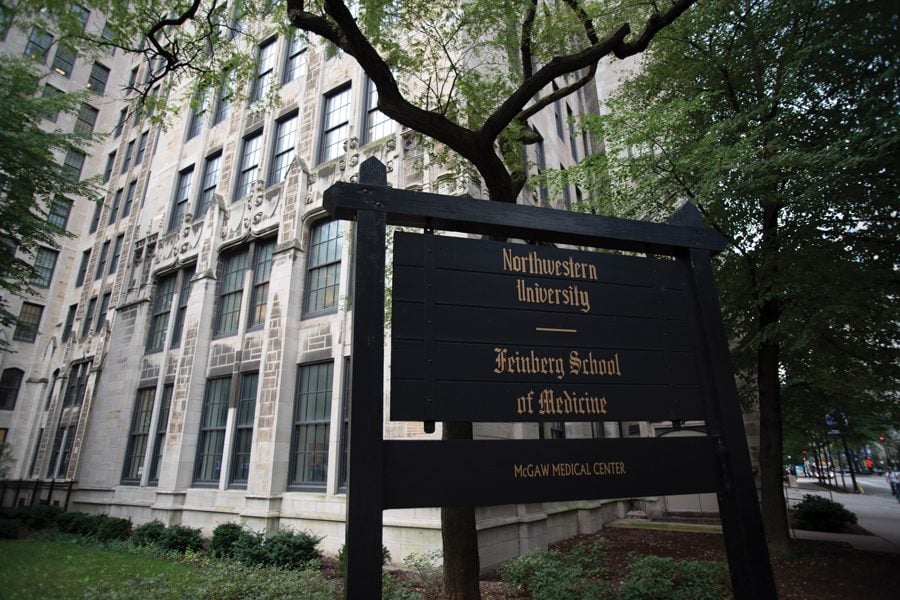Unwithered by budget deficit, research remains the flagship of Northwestern
Colin Boyle/Daily Senior Staffer
CBC-HITES is based at Northwestern Medicine’s Comprehensive Transplant Center.
November 25, 2018
Research is central to Northwestern’s mission. Nearly a third of the budget is dedicated to it, and since the Great Recession, the University has invested in new buildings, infrastructure and equipment to support its research functions. And while many research universities may focus less on providing a satisfactory undergraduate experience, students have plenty of opportunities to conduct or engage in research.
In 2017, the National Science Foundation ranked Northwestern 29th of 902 academic institutions in research and development expenditures. NU has consistently been ranked in the top 50 in other criteria like full-time graduate students and earned doctorate degrees.
Much of the University’s academic reputation rides on its research functions, as it attracts top-tier faculty and students. It’s no wonder, then, why University leadership has tried to steer budget cuts clear from the Office for Research.
“We want to protect the academic core as much as possible,” Provost Jonathan Holloway said in an interview last month.
But research hasn’t completely avoided budget cuts. The office is part of what the leadership calls “The Center” — which includes the president’s and provost’s office — which faced cuts and layoffs in July. Administrators have declined to provide specifics, but Jay Walsh, the vice president for research, said the office experienced “personnel changes.”
“The vast majority of those were positions that were vacant,” he said in an interview last month. “In some cases, we would look at multiple positions and reformulate them. We had to cut other things, we did have to cut support that we provided for institutes and centers. We have to be more careful about how we’re going to support core facilities.”
The office guides researchers in applying for grants, manages the various centers and institutes and disperses funds once they come in. It is a critical component of supporting researchers, from helping faculty get published to ensuring research is conducted according to regulations.
In addition to cuts made to “The Center,” the office was told by administrators to cut 10 percent of the budget this year, though Holloway said the exact amount is “complicated.” Much of the office has grown, like sponsored research, while other parts have not.
A large part of this increase in sponsored research has gone to the Feinberg School of Medicine. Holloway estimates that three-fourths of sponsored research goes to the school, and Dean Eric Neilson said its sponsored research has been “growing at an compound annual growth rate at Feinberg of about 6 or 7 percent since 2012.”
Neilson attributes this to the broad array of research his faculty conducts. Holloway said it’s “deeply reassuring” that Congress has remained committed to funding science research in the current political climate, compared to the uncertainty he felt two years ago when he joined Northwestern.
Neilson wasn’t surprised. “Both Republicans and Democrats, particularly in the last six or seven years, have been quite supportive of biomedical science,” he said. “It’s one of the few things that the government does really well, compared to the long list of things that it does terribly.”
Undergraduates will also have access to more funding for research. Holloway increased the budget for undergraduate research in anticipation of what it would spend, replacing a previous practice that retroactively approved expenses — part of the University’s budget management overhaul. The increase is also a reflection of increased interest, he added.
Despite the setbacks, administrators remain optimistic about the long-term outlook. Neilson said while it may take time to gain prestige and reach the top, he said he’s fine, for now, with being “somewhere well placed in the middle.”
“We carry the flag as a research-intensive university,” he said. “This is one of the great periods in history where science has so much potential to add value. I want Feinberg and I want Northwestern to be able to take advantage of that.”
Daniel Vesurai contributed reporting.
Email: [email protected]
Twitter: @_perezalan_


